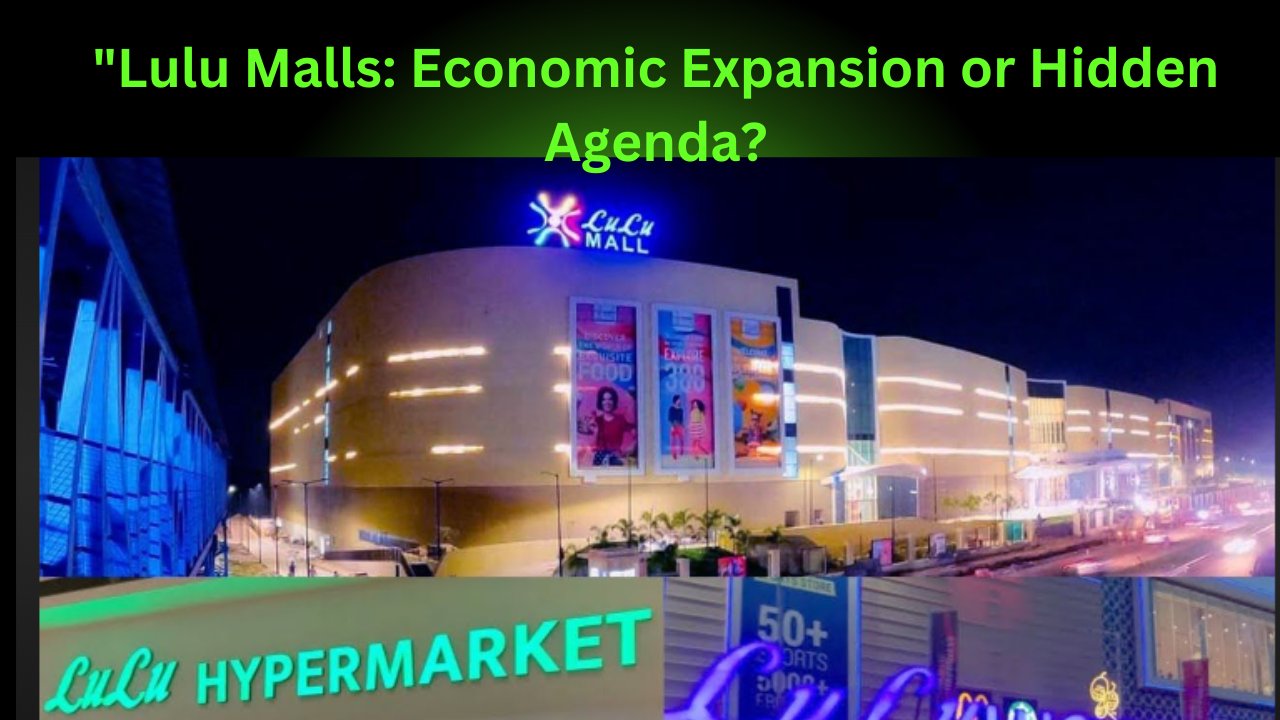
Watch the Video: https://youtu.be/muLBj8zR574
Lulu Malls, owned by Yusuf Ali M.A. of the UAE-based Lulu Group, have become a dominant name in the retail landscape of South India, notably in Kerala and now extending into Coimbatore and Bangalore. These mega-malls, known for their luxury amenities, vast selection of global brands, and upscale shopping experiences, attract thousands of visitors daily. But the rapid expansion and placement of these malls have sparked discussions about their broader impact on local communities, culture, and economy, especially as they mainly avoid areas with large Muslim populations in favor of Hindu-majority regions.
The entry of Lulu Malls into these areas is seen by some as a potential threat to small businesses and the local economy, as well as a strategic move that could influence local demographics and politics. This article takes an in-depth look into these concerns, exploring the social, economic, and cultural aspects of Lulu’s growth in India and beyond.
The Appeal of Lulu Malls
Lulu Malls have gained massive popularity due to their modern design, wide range of products, and luxurious ambiance. The appeal lies not only in the shopping experience but also in the sense of luxury they bring to customers, especially in areas that previously lacked such high-end facilities. The range of international brands, food courts, cinemas, and ample parking are additional attractions, making Lulu Malls a preferred weekend destination for families and young adults alike.
With their success in Kerala, Lulu Malls have expanded into Karnataka, with Coimbatore and Bangalore being recent targets. While the economic potential is undeniable, the choice of location and recruitment practices have raised concerns among critics.
Controversial Location Choices and Economic Impact
A significant point of contention around Lulu Malls is their strategic placement in Hindu-majority areas, avoiding regions with high Muslim populations, such as Kannur, Kasaragod, and Kozhikode in Kerala. Critics argue that this is a deliberate move to support Muslim-owned small businesses in Muslim-majority areas while establishing a large, competitive presence in Hindu-dominated regions.
By avoiding areas with many Muslim-owned small businesses, these malls appear to protect the interests of smaller traders in those regions, while in Hindu-majority areas, they create intense competition for local retailers. The arrival of Lulu Malls in Hindu-majority areas often leads to a surge in Muslim-owned businesses around the mall. Over time, these local enterprises reportedly push out other small businesses, potentially altering the economic dynamics of the area.
Recruitment Practices and Social Concerns
Another controversial aspect is Lulu Mall’s employment practices. Reports suggest that a large number of male employees in these malls are recruited from Muslim-majority areas like Malappuram, while many of the female employees are from Hindu communities in the areas where the mall is located. This hiring pattern has raised social concerns, particularly among parents of female employees, who worry about potential cultural clashes and risks, especially considering India’s broader conversations around interfaith marriages and relationships.
Some critics label this as a form of “Love Jihad,” a term used controversially to describe relationships where Muslim men are perceived to be attempting to convert women from other faiths to Islam through marriage. While no formal evidence supports these claims in Lulu Malls specifically, the choice of recruits has fueled apprehensions, making this a sensitive issue in communities where such relationships are met with social challenges.
Political Influence Through Employment and Demographic Changes
Lulu Malls’ presence also introduces potential political implications. With each mall employing around 20,000 individuals, including 15,000 from Muslim-majority areas, critics argue that the malls create a local demographic shift by bringing in large numbers of people who may not originally belong to the area. If each employee brings their family, the total influx of people could influence local demographics and voting patterns, potentially altering the political landscape.
Critics believe that this phenomenon could lead to an increase in voters from certain backgrounds who could sway elections in favor of candidates who align with their beliefs. Although there’s no formal evidence of direct political motivations behind Lulu’s hiring practices, the argument reflects the broader suspicion that demographic shifts may have long-term political ramifications in the affected regions.
The Role of Foreign Funding and International Influence
Another aspect that fuels controversy is Lulu Malls’ funding. Critics highlight that funds from Middle Eastern countries, particularly Qatar, have been used to establish these malls. Qatar has been linked to funding certain controversial organizations globally, leading to suspicions regarding Lulu Group’s partnerships with such investors.
Though Lulu Group has not been implicated in any illegal activities, concerns about foreign funding stem from apprehensions that the investments may serve not just commercial interests but could also align with agendas that may not align with local interests. The perception of Middle Eastern influence adds a layer of complexity to the narrative, making people question whether these ventures align with or oppose local values.
The Silent Boycott Movement
Amid these concerns, some individuals and groups have called for a silent boycott of Lulu Malls, urging people to avoid shopping there as a way of protecting local businesses and preserving local culture. The boycott movement argues that supporting smaller, local businesses is essential to maintain the character and economic diversity of communities.
While the silent boycott has yet to significantly impact Lulu Malls’ business, it represents a growing sentiment among locals who believe that unchecked expansion of large malls owned by foreign-funded corporations may have long-term negative effects on society. Supporters of the boycott believe that raising awareness and choosing to shop locally are the best ways to counter the economic and cultural influence of such malls.
Conclusion: A Complex Issue with No Simple Solution
The debate around Lulu Malls and their impact on South India is complex and multifaceted. On one hand, these malls offer an upscale shopping experience and economic opportunities that were previously unavailable in many parts of India. They create jobs, boost local economies, and attract visitors, contributing to regional development.
On the other hand, the concerns regarding employment practices, potential demographic shifts, and foreign funding cannot be ignored. The perception of “Mall Jihad” and its implications on local businesses and cultures underscore the anxieties that accompany large-scale commercial ventures in close-knit communities.
The discussion around Lulu Malls exemplifies a broader dilemma that many regions around the world face as globalization and foreign investments reshape local economies and societies. Finding a balance between economic growth and preserving local traditions, businesses, and demographics is essential for creating sustainable communities that thrive without compromising their cultural integrity.


